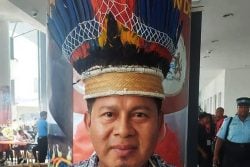Vulnerable groups in the Guyana penal system—women, children and indigenous people—are made to suffer undue hardships and better provisions must be made for them, according to the final report of the recently concluded Prison Commission of Inquiry (CoI).
Women offenders, who are often “victims of men,” should not be sent to jail unless it is absolutely necessary, the CoI report said, and it has proposed the establishment of a half-way house for those convicted of non-violent offences to help in their rehabilitation.
“Prison is a much harsher experience for women than men. On the outside, women are usually the ones responsible for looking after the family and children. An extended stay in prison usually means women emerge to find their children dispersed, their partners no longer around and their homes taken over by others. A revolution in attitudes to women’s imprisonment is needed,” the report said.
The report was handed over to President David Granger two weeks ago and Stabroek News has since been furnished with a copy of the document.
According to the report, the great majority of women offenders do not constitute a threat to society which is the primary justification for incarceration.
It said that in this regard, the way society deals with women is simply an extension of what is considered appropriate for men. “When a policy turns out to be inappropriate for men, it is usually disastrous for women, which is clearly the case with the current penal policy,” the report said.
Based on the statistics presented women represent 4% of the entire prison population.
It pointed out, “Security arrangements at the Women’s Prison in New Amsterdam, Berbice, are extensions of what is in place for the men’s section within the same compound: an unnecessarily depressing multiplicity of locks, bars, barbed wire and electronic devices in overcrowded spaces.”
The report said women are usually incarcerated because “they are the victims of men either by being used as drug mules, or for stealing so as to feed children for whom child-fathers are not providing, or they are on murder charges for having turned violently on a brutal male partner. Most of the women in prison have themselves have either been physically and/or sexually abused since childhood and are in need of help not punishment.”
It stated that rather than imprisonment, these women in trouble with the law need the safety of half-way houses in which they can “get their life together, develop the self-confidence and the skills to care for themselves and their children and eventually re-start life.” The report said that a different system of very small, self-sufficient units with active programmes of training with considerable involvement from outside agencies is urgently needed.
“It is evident that imprisonment of a parent or guardian may work considerable hardship on innocent children who are forced to relocate to live with others, change schools and suffer hardship. The impact on children of various forms of sentencing of adult relatives is not taken into account in sentencing decisions in Guyana,” the report said.
It was recommended that except in “very exceptional circumstances, women should not be sent to prison at all.” The CoI also recommended that women’s role as caregivers should attract much higher priority in determining whether to imprison them, adding that “Long-delayed trials, venal lawyers and poorly-trained magistrates prolong and aggravate a basically unsound method of dealing with women involved in crime, creating overcrowding.”
The report spoke too of having all complaints of sexual harassment by officers of state agencies made by women prisoners investigated promptly given the high level of sexual abuse and exploitation to which these detained women are vulnerable.
According to the report, a women’s remand prison should be established in Demerara within the Lusignan Prison environment.
It was stressed that judges and magistrates must respect incarceration of women as “a last resort measure.”
Meanwhile, it was stated that indigenous people, another vulnerable group, often have their rights violated. It was stated that in addition to general inhumane conditions, indigenous people suffer additional hardships including longer delays given the court set up in their communities and unsuitable diets.
In the report it was recommended that summary matters in hinterland communities should be resolved in one session as originally intended by this category of offences.
It stated too that in cases of indictable matters indigenous people should be remanded in regional facilities rather than in the Georgetown Prison.
With regard to juvenile prisoners, it was stated that their incarceration must be restricted according to the principle of last resort. It was recommended too that the police must charge men for grooming, rather than charging girls for wandering.
The report said that the Holding Centre in Sophia should be replaced by arrangements which are conducive to restoring good conduct, health and safety of children in accordance with the rights of the child.
The Ministry of Public Health, it was recommended needs to adopt a more proactive approach to the health of the prison population in general and, in particular, with respect to inmates who are HIV positive, diabetic and mentally ill.




